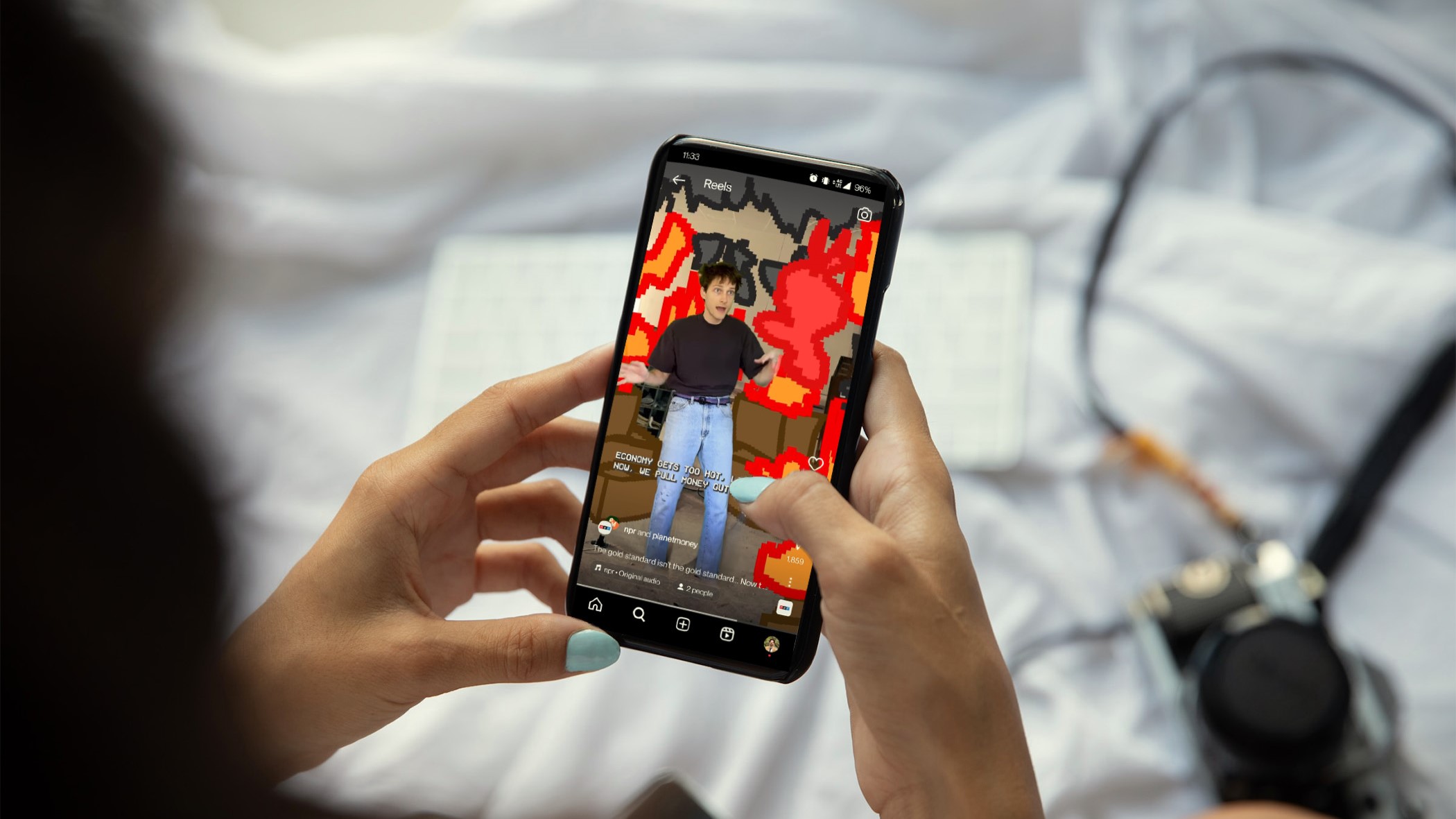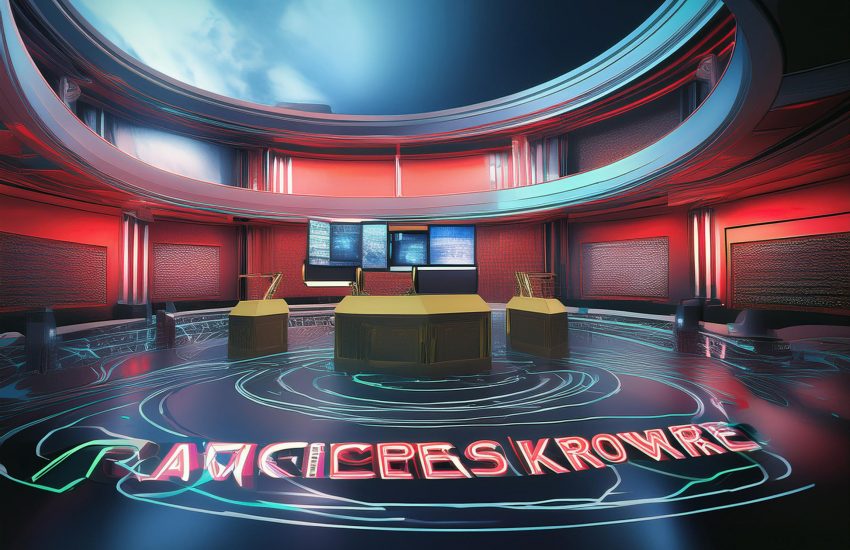How an intern’s “Dadaist” economic skits took over NPR’s TikTok
Legacy news outlets like NPR are historically concerned with maintaining a consistent brand. But when Jack Corbett, a former intern at NPR’s Tiny Desk, started making explanatory skits for the outlet’s TikTok account in 2020, they were happy to “hand off the reigns,” Corbett said.
“It felt like the stakes were lower,” Corbett said. “Because, if we tried and if we failed, it’s fine because like, it’s on that ‘kid dancing app.’”
In the years since, Corbett — now a producer for NPR’s Planet Money — has made a name for himself on the platform by explaining complicated, often esoteric economic concepts through his own unique style of “serial killer-esque, Dadaist” skits. As many news outlets struggle to attract a younger audience, Corbett’s style offers a desperately-needed new approach.
Storybench sat down with Corbett to talk about his unique outlook on video storytelling and the lessons it offers to other journalists.
The following interview has been edited for clarity and length.
Many young journalists are apprehensive to pitch something like your videos. How did you do it?
I’ve always been really bad at verbal pitches. So when I sent them the idea [for the stock market circuit breaker], it was already a video. That makes it a lot easier. Especially with weirder ideas like this, and with a platform that people aren’t used to, if you could just show them what the idea is and also show them that people get that, then it’s a lot easier, you know? That did result in many, many videos that I’ve made that are like, “Hey, what if we do this?” and then it’s like, “No.” It’s just crickets. But hey, you’ve got to swing, you know, swing and miss.
@planetmoney Everyone has to chill out sometimes… even the New York Stock Exchange! #economics #money #stockmarket #tiktokpartner #learnontiktok ♬ original sound – planetmoney
How much do you think about the audience when you’re planning and creating your videos?
It’s pretty secondary, because I’m really just trying to make something that I like. In the first year, I would really try and make videos where I’m thinking, “The audience is really going to like this. I’m hitting all these points. I’m getting references. I think they’re going to like this.” And whenever I would feel that way, the video would just tank. Now, I’ve noticed that what does well are topics that I’m genuinely curious about, stuff I just don’t understand. I’m just trying to make something that I think is silly and stupid and perfect.
One of the things that makes your videos stand out is the element of comedy. What role do you think that serves in the videos you’ve made?
I just don’t know how I would make videos without that. I just think economics is the funniest thing. After the first couple of months, I was like, “Oh, no, how am I going to make these videos?” I thought I had just stumbled across one little thing called the stock market circuit breaker that was very silly. And I’m like, “Well, now there’s like nothing else in this entire field.” But really, [economics is] all just behavioral weirdness. That just makes it so easy. It’s just something about the topic area, it’s better than any punch line, whatever the concept is. There’s always something weird about it, whether [economists are] like, “Oh, you know, we’re doing this because we’ve always done it this way.” Or like, “Well, you know, we just made this up.” I can’t make videos not like that. It’s kind of stuck, always on.
Do you ever think having that comedic approach runs the risk of making light of a subject, or oversimplifying?
Definitely. We made a couple of videos in response to the Ukraine invasion. There’s one about the Golden Arches theory of conflict resolution, which is like, if two countries have McDonald’s, they shouldn’t go to war, which is just a funny concept. But I also think about the military-industrial complex and how these are all very serious things. It’s a lot easier in those regards to do something animated, something that’s not a skit. A lot of things about economics can be really serious and really dire, and things need to change. I just found that animating in those cases is better. It’s just easier.
@planetmoney The U.S. is using sanctions to punish Russia for invading Ukraine #ukraine #russia #sanction #economics #learnontiktok ♬ original sound – planetmoney
@planetmoney What is the Military Industrial Complex and why did we spend more than $700 billion on defense last year? #military #war #economics #learnontiktok
Do you think that print and audio journalists can learn something from the way that you approach creating news?
It’s just all about getting the platform right. The thing about Planet Money is that the whole time they haven’t been like, “All right, now we need a link to go back to Planet Money. We need to get these people back to the podcast.” The entire time [NPR’s] TikTok has been on its own, it’s like another limb of this giant amorphous octopus of Planet Money. This is not a billboard. We’re not trying to sell you NPR.org.
It’s also the approach I have. I’ve never studied economics, so it’s just approaching it like someone who knows absolutely nothing about the subject. If you’re talking about economics and you start saying words like “dividend” or “residuals,” you’re immediately going to lose however many percent of the audience didn’t take Economics 101. It’s just about making language inclusive. It’s not like it’s going to stop you from saying anything, because any complicated economic term can be explained quickly and more simply. There’s no sense in cutting off a huge swath of your audience. Language, I think, is really important in that way.
If an older reporter was looking at your videos, do you think they could take something away from that approach or do you think it will inevitably just come across as pandering?
It doesn’t have to. I’ve seen people excel at TikTok from every single age demographic. If you’re really on the platform that you’re making content for, you won’t be pandering. If you make videos that you wish you could see from the outside, then it’s not ever going to be pandering. I can’t think of anything better than TikTok for local reporters just because when you post a TikTok it goes to people around you. TikTok also has a great way of just finding the audience. I follow local reporters from random towns across America, and they can make content that really cracks me up. It could be something that’s not even relevant to me at all, like if they’re talking about [something like] a mill in Indiana, that has no bearing on me. But just the way they’ll cover it makes it interesting.
It’s almost a cliche for people to say Gen Z audiences just want short, visual content. Do you think it’s that simple?
I don’t think so. I think the idea with TikTok is that it’s always been about respecting the audience. I didn’t want to put out anything that felt like I would use words that the audience wouldn’t understand and turn people away. It’s all about being inclusive in that way. And I think that works across platforms. That’s something that’s pretty big at NPR. Part of trying to respect the audience means making something native to TikTok, so it feels like, “Wow, this isn’t just a video. This isn’t a YouTube video. This isn’t like anything else. It’s just a TikTok.” I think that was the thing early on, like you’re not making videos, you’re making TikToks. If you rip a video and then pour it onto a new platform it’s not going to do as well as anything that was designed for it. And I think audiences on TikTok get that immediately.
- How an intern’s “Dadaist” economic skits took over NPR’s TikTok - December 19, 2023





